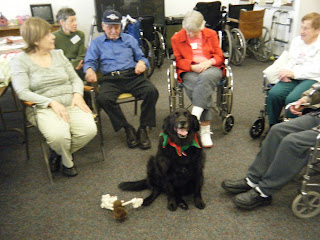I grew up with two golden retrievers, Luke and Rusty. There was nothing better than seeing their
expression of bliss when I got home from school, seeing the satisfaction they
received from bringing me back a tennis ball, or the comfort they brought me
when I was feeling down. I thought of
them the day I met Ginger.
Ginger’s family learned this year
that osteosarcoma is the most common primary bone tumor of large breed dogs,
often occurring in the metaphysis of the long bones. Unfortunately, most owners of a dog diagnosed
with this cancer are confronted with a decision of whether to amputate a limb
or to help the dog maintain its quality of life as long as possible while
living with this painful bone lesion.
The outcome of this decision varies and is dependent on several
factors. When it comes to making sure you are making
the right decision for that loyal companion, you want to be sure that you have
all of the information you need to make it.
Several people have told me that I
must have been temporarily insane when I chose to become an oncologist. Cancer and chemotherapy are not words that
people look forward to hearing and chemotherapy is certainly not something they
look forward to giving to their pets. I
have even been told by my clients “I hope I never see you again, Dr. Linderman”
and I tell them “The feeling is mutual.”
This aspect of the job is quite
challenging, but the results make it worth coming to work every day. It is not always the right decision to perform
a radical procedure, such as an amputation, or to recommend a course of
chemotherapy; but, for the right patients, it is a life saving decision. The video attached to this blog was taken 6
months after Ginger’s amputation. Like
most dogs after surgery, she had no side effects while going through her course
of chemotherapy. No evidence of recurrent
disease was seen on the work-up that day and we are looking forward to seeing
her beautiful face again in 3 months for another quick check up.
I once watched a documentary about the artist Bruce
Bickford and learned that there are two terrible things about life: 1. “it is so terrible” and 2. “it is so
short!” While cancer is one of the most
terrible events that life has to throw at us, we do not have to give up. There have been many incredible advances in
veterinary cancer care. With a little
sacrifice in the right places, we can find hope and continue to give back to
our pets the same devotion they show us.
Dr. Michael J. Linderman"Ginger just a few week after her surgery"


